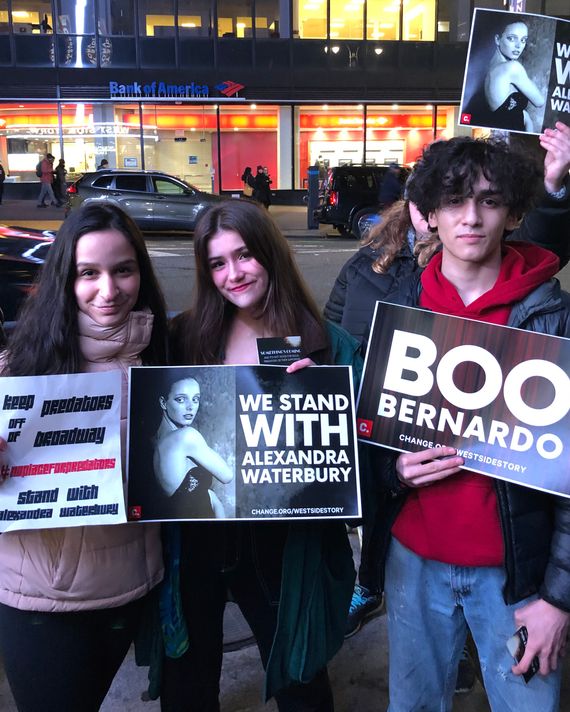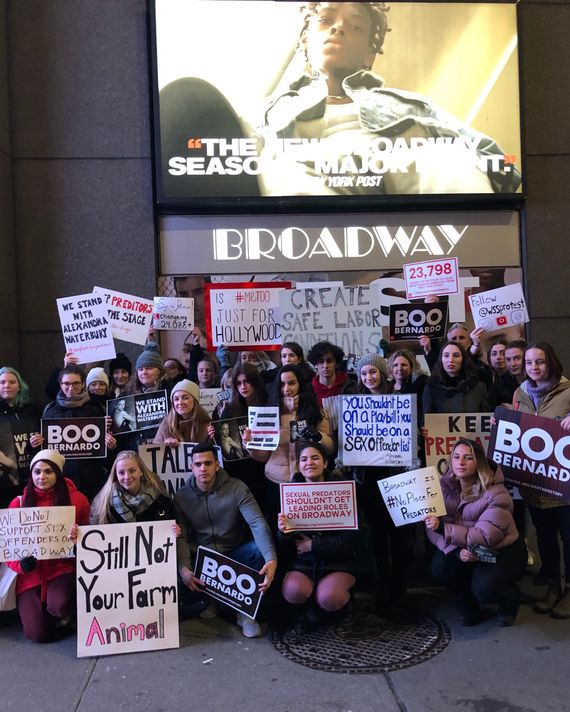
On a cold Friday night, a small crowd was gathered outside a neon marquee for the new production of West Side Story on Broadway. But they weren’t there to see the show. They held up signs: “Sexual predators shouldn’t get leading roles on Broadway,” read one; “Is Me Too just for Hollywood?” asked another. A third bore a photograph of a ballerina glancing over her shoulder: “We Stand with Alexandra Waterbury.” Nearby was the ballerina herself, wearing a black leather jacket and white sneakers, blonde hair spilling over a chunky black and white scarf; she held up an awkwardly large piece of poster board: “Still not your farm animal,” it read.
Two years ago, when Waterbury was 19, she woke up in her boyfriend’s apartment, checked her email on his computer, and accidentally discovered a series of photographs of naked girls and their private parts. They included ones of herself, as well as a short video of her having sex. Her boyfriend at the time, Chase Finlay, was then a principal dancer at the New York City Ballet; they’d met when she was a student at the School of American Ballet, the company’s affiliate academy. Finlay had been sharing the photographs — which Waterbury says were taken without her consent or knowledge — on group chats with friends, including other members of the company. “I bet we could tie some of them up and abuse them like farm animals,” a young donor wrote in response to one of the photos, according to a lawsuit Waterbury filed back in 2018. Amar Ramasar, a friend of Finlay’s and a star dancer at the company, shared a shot of another ballerina, bare-chested, along with a photograph of her vagina. A few months later, in the midst of an investigation into the incident, Finlay voluntarily resigned from the company. Ramasar was fired, along with another principal dancer in the group chat. Both dancers were reinstated to the company after the dancer’s union challenged the firing and brought in an arbitrator who ultimately ruled that the company had gone too far in disciplining the two men. As part of their rehabilitation, they were assigned mandatory counseling.
Today, Ramasar is starring in West Side Story as Bernardo, the leader of the Sharks*, and he’s the reason Waterbury and about two dozen others — an eclectic group including ballerinas, aspiring actors, and a 75-year-old retired history professor — were protesting the show. As Waterbury sees it, he has yet to be held fully accountable for his actions.
“It’s bullshit,” said Waterbury, hoisting up her sign.
Not everyone shares her perspective. On Friday, Ramasar’s girlfriend, whose nude photos he shared two years ago, put out a statement saying he has been unfairly targeted. Alexa Maxwell, a New York City Ballet corps dancer, has been dating Ramasar for five years. In an interview with the New York Times, Maxwell called his text messages a “misstep in judgment.” She said he had apologized to her multiple times, and that she had already forgiven him. When asked about Maxwell’s statement, Waterbury said it didn’t change her view of the situation. “Whether or not she says it’s okay now, what he did was illegal. The things that Chase did to me, Amar did to her,” she said. “She’s going to deal with it in whatever way she needs to deal with it, and that’s obviously trying to avoid the truth of the situation.”
Waterbury and her fellow protesters see Ramasar as part of a larger system of abuse in the often brutal world of ballet. “It’d be hard to find a dancer in New York City, male or female, who hasn’t experienced some sort of sexual misconduct in their career,” said Waterbury’s best friend, Emmy, a fellow ballet dancer and her classmate at Columbia University.
The same year that Waterbury discovered the photographs, the director of the New York City Ballet abruptly retired in the midst of an investigation into his abusive behavior, which had been public knowledge for decades. To pick one of many well-documented instances, back in the ’80s, Peter Martins spent a night in jail after beating his wife, a ballerina at the company nearly 20 years his junior, whom he’d first met as a 16-year-old student at the School of American Ballet. “The issue is that there’s no checks in place for administration and management to rectify situations,” Emmy said. “And that’s partly because what is valued in ballet is artistic innovation as opposed to professional integrity. There’s this glorification of the struggle of the pain you put yourself through.” She gestured at her sign: “Talent cannot justify abuse.”
A line started to form outside the theater as the protesters chanted, “Hey, hey! Ho, ho! Amar has got to go!”
Some of the ticket-holders took photographs; others willingly accepted the informational postcards the protesters handed out. Waterbury offered one to a man in long camel overcoat. He raised his hand in dismissal and resumed studying his iPhone.
“I feel like my sign is pretty off-putting,” she said, shrugging. An older woman in a fur coat was more receptive. “He should not be in this show,” she said, shaking her head. “I’m embarrassed I bought tickets.”
“It’s okay,” Waterbury offered. “Just boo him.”
“That was so disgusting. He got away with it?” she asked. “No punishment, no anything?”
“He had to go to therapy.”
“How did they allow that?”
“That’s why we’re here,” Waterbury said.
“Screw Bernardo,” the woman said emphatically as she walked inside.
Waterbury and the two other women organizing the protest — a young dancer named Megan Rabin from Boston and a local high-school student named Paige — said they hoped Ramasar would be held accountable. “I am pursuing a career in theater, so obviously Broadway is a big dream of mine,” said Paige. “But the idea of going into a career where someone who’s done something like this is not only tolerated but accepted …” She took a breath. “There’s nothing else that I want to be doing, but I don’t want to be doing it while powerful men continually decide to completely demean women by supporting people like this.”


This is the second protest they’ve held during the show’s previews; several others are scheduled over the next few weeks leading up to the opening on February 20. “I can’t even imagine what it feels like to be an actor who has to work with him,” said Rabin. Although no one in the cast has officially spoken out about Ramasar, after walking by the protesters last week, a cast member anonymously reached out to the theater blog, On Stage, with a note. “I’m writing this to you on my way home from the theatre and my hands are shaking. Is it from the cold or my nerves writing this? I can’t tell,” the person wrote. “What I do know is that I support anyone and everyone protesting Amar’s casting. I’m not speaking for anyone else in the cast but it’s been an issue for me from the moment he showed up to rehearsals.”
As the line grew longer, many ticket-holders walked by the protesters without making eye contact; those who stopped to talk seemed to mostly agree that Ramasar’s behavior was bad, though none that I observed chose to throw out their ticket and walk away. A man in a striped scarf studied Waterbury’s sign then paused to speak with her. “Tell me the quick story,” he commanded.
“He sent and received naked photos of people without them knowing or consenting,” she said.
“Obviously that’s no good,” the man said.
“Google Peter Martins,” Waterbury advised. “They all learned from him.”
“So, he’s encouraging proteges to behave like himself,” said the man. “That’s sick and bad. I hate that. Okay.” He accepted a postcard and walked into the theater. Waterbury set down her sign and rubbed her hands together, shivering in the cold. She’d been nervous heading over, but now she was feeling better. “I spent all day at school not doing my homework, which is what I really needed to be doing,” she said. “But that wasn’t so bad. I’m feeling pretty good.”
*An earlier version of this piece stated that Bernardo is the leader of the Jets in West Side Story. He is in fact the leader of the Sharks.


